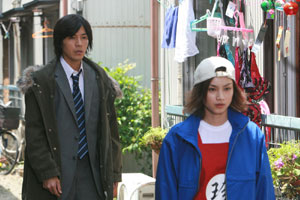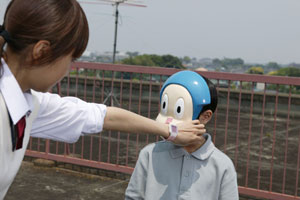|
|
|
|
|
|
|
|
20th Century Boys:
Chapter 2 - The Last Hope |
|
|
|
 
(left) Naohito Fujiki and Airi Taira, and (right) Haruka Kinami tries to unmask
a possible "Friend"in 20th Century Boys: Chapter 2 - The Last Hope.
|
|
|
Japanese: |
20世紀少年 <第2章> 最後の希望 |
|
|
|
Year: |
2009 |
|
|
|
Director: |
Yukihiko Tsutsumi |
|
|
|
Writer: |
Yasushi Fukuda, Takashi Nagasaki,
Naoki Urasawa,
Yusuke Watanabe |
|
|
Cast: |
Etsushi Toyokawa, Takako Tokiwa, Airi Taira, Teruyuki Kagawa, Naohito Fujiki, Arata, Fumiyo Kohinata, Yusuke Santamaria, Hitomi Kuroki, Haruka Kinami, Mirai Moriyama, Kuranosuke Sasaki, Renji Ishibashi, Eiko Koike, Toshiaki Karasawa, Takashi Ukaji, Hidehiko Ishizuka, Arata Furuta, Naomasa Rokudaira, Jiro Sato, Rina Hatakeyama, Nana Katase, Ken Mitsuishi, Yoji Tanaka, Katsuo Nakamura, Osamu Shitara, Masahiko Nishimura, Katsuhisa Namase, Cynthia Cheston, Toru Tezuka, Ken Tanaka, Kenjiro Ishimaru, Fred McQueen, Shigenori Yamazaki, Masahiro Komoto, Hirofumi Araki, Sumie Sasaki, Jun Nishiyama, Yuki Himura, Kazuhiko Nishimura, Raita Ryu, Shinichi Hatori, Tamaki Matsumoto, Masao Komatsu, Ken Maeda, Naoko Ken, Hanawa, Kenichiro Tanabe, Yoshihiro Nozoe, Muneyoshi Abiko, Sakae Umezu, Kazuo Tokumitsu, Kaoru Fujiwara |
|
|
The
Skinny: |
20th Century Boys: Chapter Two should be a slam dunk for fans because it adapts the manga in a truncated, but still slavishly faithful manner. For non-fans, this film is so dense and convoluted that confusion is a likely result. Maybe it'll seem like a better film after the third one is released. |
|
| |
|
|
|
|
Review
by Kozo: |
The middle movie is always the hardest. 20th Century Boys: Chapter Two - The Last Hope, has the unenviable task of bridging a gap between the first and third portions of a film trilogy, connecting two films while also possessing enough identity of its own to remain compelling. That's two things to accomplish, but while Chapter Two does the first thing well, it stumbles heavily at the second. Director Yukihiko Tsutsumi has delivered an intriguing thriller, but the material is so dense and ultimately so far-fetched that it may have a hard time keeping an uninitiated audience involved. At least it's faithful to Naoki Urasawa's original acclaimed manga.
Tokyo, 2015. Japan is now a different place fifteen years after the cult of "Friend" unleashed both a deadly virus and a very large explosion on Tokyo. Friend has fooled the world into thinking that it was Kenji Endo (Toshiaki Kawasawa) behind the terrorist acts of the late twentieth century, and has since become a beloved national and even global figure. Meanwhile, Kenji's niece Kanna (Airi Taira) is busy making friends with gangsters on the seedy side of Tokyo. She's out to oppose Friend and restore her uncle's good name, and earning followers will only help her cause. Kanna is all about helping people in a righteous, forthright way, and inadvertently earns fans and friends, but also the attention of her would-be enemies. Basically, Kanna is special.
How special? Well, Kanna has ESP and she's called "the Chosen One" and "the Last Hope" by various people. These people range from Kenji's old childhood friends, including adopted aunt Yukiji (Takako Tokiwa) and imprisoned tough guy Shogun (Etsushi Toyokawa), to Friend's most loyal followers, like assassin Number Thirteen (Arata) and creepy zealot Takasu (Eiko Koike). The actual significance of Kanna's "specialness" is somewhat lost during the course of the film. She possesses tough gazes and an attractive rebellious edge, but it's ultimately unclear why an ESP-toting tomboy should be such a big deal - even if she does happen to be Friend's daughter. Also, in his absence Kenji has become a near-mythic figure, with close friends admiring him so greatly that their reverence seems a bit extreme. Add all that to the fervent cult surrounding Friend, and one has to wonder what everyone in 20th Century Boys is smoking.
Well, whatever dope is being passed around, Naoki Urasawa is the one who first handed it out. The 20th Century Boys manga is so convoluted that there's no way the combined three movies will be able to completely adapt the whole thing. Stepping back to take a look, the whole is some outlandish, crazy stuff, especially when you factor in the world-altering storyline, virtual reality plot device and childish motivations. Still, what arguably makes the manga so enthralling is its depth and denseness. It's so layered and overwrought, and possessing of so many rousing themes (friendship, righteousness, faith, childhood dreams, the sanctity of life) that it can't help but affect - especially since it gives compelling backstories for even the most minor of characters. The serial format also played a large part in the manga's success, as each week's chapter effectively built suspense for the next. Urasawa is a terrific storyteller, and he uses his medium so well that his acclaim is justified.
On the other hand, Yukihiko Tsutsumi's film adaptation of the 20th Century Boys saga is so unflinchingly faithful that it borders on irretrievably cheesy, and only is compelling because it's an abridged mirror-image of the manga. The casting for 20th Century Boys is dead-on, with many of the actors physically resembling their counterparts. Sets, props and costumes are exact duplicates of those in the manga, and the story is so faithful that it even mirrors the illogical portions of its source material. However, it seems the effort has been put into condensing the manga for the screen rather than adapting it, and the film is hurt by the omitted information. Also, the filmmaking craft is unimpressive and the performances are marvelously uneven; bad lighting and poor cinematography abound, and sometimes the camera only moves to distract the audience from the droning exposition. The staging is also exceptionally unrealistic, with actors seemingly waiting for dialogue cues instead of acting like normal people should. Everyone waits around to listen to long speeches that don't affect them and if someone pulls a gun, everyone hangs around to watch instead of running away like a sane person would. Sometimes, the movie even starts to resemble a shot-on-video sitcom.
However, the film does have a payoff in that the multiple storylines, characters and revelations ultimately coalesce to reveal a tangled, intriguing mythology. Also, the final two or three twists should still be enough to goad nearly anyone who sat through the first two into seeing 20th Century Boys: Chapter 3 - and that's even if they didn't get everything in Chapter 2. Full comprehension is really impossible anyway without intimate knowledge of the manga - hell, even an eyes-glued-open rewatch of Chapter 1 won't make this film that accessible. It may be best simply to take what one can from Chapter 2. Japanese cinema enthusiasts may find the film enjoyable thanks to the sprawling cast of stars and the pop-culture infused vision of a past-and-future Japan. For fans of the manga, this is a slam dunk because, well, the movie is the manga! For everyone else, this is just tough going - not coherent enough to be enthralling sci-fi and too convoluted and sprawling to make that much sense. Like any truly connected film trilogy, we may need the third one to render final judgement (Kozo 2009) |
|
|
Availability: |
DVD (Hong Kong)
Region 3 NTSC
Kam & Ronson
16x9 Anamorphic Widescreen
Japanese and Cantonese Language Tracks
Dolby Digital 5.1 / DTS 5.1
Removable English and Chinese subtitles
*Also Available on Blu-ray Disc
|
|
|
|
 |
|
|
|
|
|
|
|
|
|
|
|
|
|
|
|
| LoveHKFilm.com
Copyright ©2002-2017 Ross Chen
|
|
|